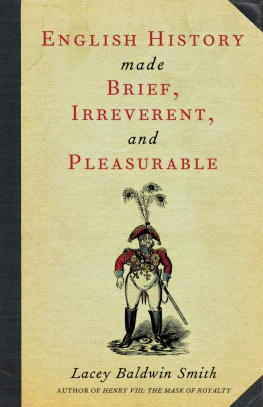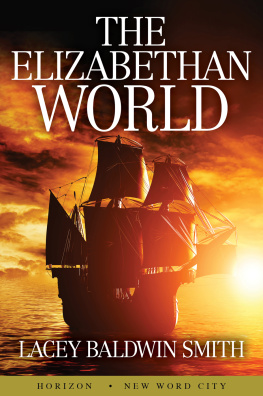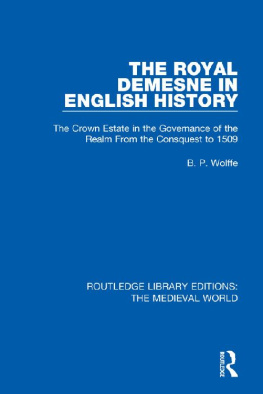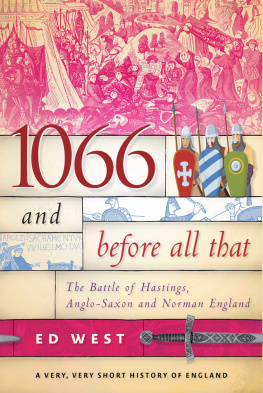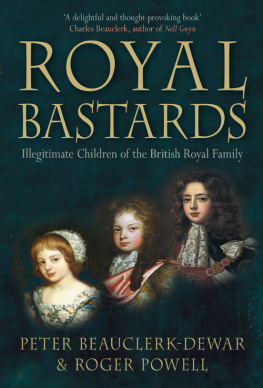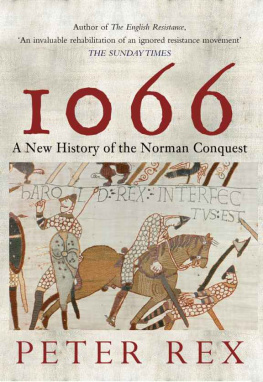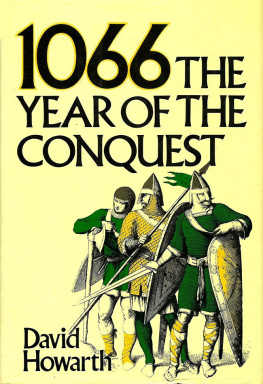
Published in 2007 by
Academy Chicago Publishers
363 West Erie Street
Chicago, Illinois 60610
2007 by Lacey Baldwin Smith
Third printing 2010.
All rights reserved.
No part of this book may be reproduced in any form
without the express written permission of the publisher.
Printed in the U.S.A.
Library of Congress Cataloging-in-Publication Data
Smith, Lacey Baldwin, 1922
English history made brief, irreverent, and pleasurable /Lacey Baldwin Smith.
p. cm.
Includes bibliographical references and index.
ISBN-13: 978-0-89733-547-8 (pbk.)
ISBN-10: 0-89733-547-3 (pbk.)
1. Great BritainHistory. I. Title.
DA30.S658 2006
942dc22
2006034420
TO
The powers behind the shaky throne: as always my wife Jean, and nowadays my three children, MacAllister, Dennison and Katherine Chandler
CONTENTS
INDEX
Chapter I
WORDS OF ENCOURAGEMENT AND COMMISERATION

N o people have engendered quite so much critical acclaim or earned such unrestrained and bitter censure as the British. The tight little island has been extolled as the Athens of modern times, the cradle of ideas and institutions that have shaped entire societies and encompassed the globe. Conversely the British, secure in their island isolation off the western shores of the European Continent, have driven Europe and indeed the rest of the world to fury by their insolent self-satisfaction and perfidious hypocrisy. For many, the words attributed to Duncan Spaeth still ring trueI know why the sun never sets on the British Empire: God wouldnt trust an Englishman in the dark. How then is it possible to reduce such a masterpiece of contradictions into an ordered narrative, to comprehend the incomprehensible? The answer, of course, is that you cant, without calling upon the magic and conceit of storytellers who select and shape their material into whatever form their imaginations and personal biases dictate. And so a double warning is in order.
First, the Anglo-Saxon component of the British Isles is unabashedly given stage center over the Celtic fringe. Ireland, Scotland and Wales appear in this story only when they impinge on English history or when it is impossible to disentangle Anglo-Saxon from Celtic culture and history. After all, the English Royal House of Stuart was Scottish, the Tudors were Welsh, and the Duke of Wellington was Anglo-Irish. Second, the warts and follies of English history, though not forgotten, are neither exaggerated nor treasured. As a specimen of his species, the English lion, who actually started off as an Anglo-French leopard, may today be more than a little arthritic and a heraldic parody of his former magnificence, but in the past he was a splendidly ferocious beast. Over the years he has proved to be a surprisingly resilient creature, possessed of an unparalleled talent for dressing his aggressive instincts in the deceptive mantle of good intentions. As a consequence, true Anglophiles are always inclined to ignore his appetite for raw meat, forgive him his pride, dismiss his tendency to regard anyone born in the Celtic fringe as slightly fey and all visitors from the United States, Canada, Australia, New Zealand, India, Pakistan and Africa as ex-colonials, and concentrate on the magnificence of his royal performance.
When the author of this slim volume asked his friends, mostly at cocktail and dinner parties, to free-associate on the essence of Britishness, a few elderly types answered Empire; a younger generation spoke of warm beer, tea, umbrellas and the Royal Family; but the most common response of all was simply to say history. Great Britain may no longer be a great world power, but Britannia still possesses a great history and, except for a short chapter on a few indispensable facts and figures about the tight little island, that is what this book seeks to recount: the English part of British history made brief, irreverent and pleasurable.

Britannia and the English lion are more than a little arthritic
Chapter II
MATTERS OF GEOGRAPHY, DEMOGRAPHY AND TERMINOLOGY

W e invariably speak of the British Isles as two islands: England-Wales-Scotland and Ireland. Actually they are an Atlantic archipelago of 400 islands, of which 200 are inhabited. At one time the two major islands were attachedat their closest point only ten miles divide themand scarcely 10,000 years ago the entire archipelago was connected, probably in a fairly marshy fashion, to the European continent.
The name Britain stems from Brythonic, one of the two dialects spoken by the Celtic peoples of the isles: Brythonic was the language of England and Wales, Goidelic the tongue of Scotland and Ireland. The Celtic peoples inhabited most of Western Europe, and though later generations of Britons might bitterly resent it, British Celts were closely tied to their continental brothers and sisters in culture and kinship, the Parisi of Yorkshire being related to those Celts in Gaul who gave their name to the river settlement that eventually grew into the capital of France.
In size, the two islands are only slightly larger than New England and New York combined. England is 50,000 square miles, which is 900 square miles larger than the State of New York; Wales is 8,016 square miles, or almost the size of Massachusetts; Scotland is 30,400 square miles, about equal to Connecticut, New Hampshire, Rhode Island and Vermont combined; and Ireland (the Republic of and Northern Ireland) is 32,000 square miles, or the area of Maine. As a consequence, the British have difficulty comprehending the size of the rest of the world. The story is told that back in the days of sea travel, an English family sent their daughter off to New York. Not wanting to have their only child land unescorted in such a dangerous city, they telegraphed a friend in California asking him to meet her. He wired back, Meet her yourself, youre closer.
By New World standards the tight little islands may be small, but in population, they are extremely crowded. The overwhelming bulk of the population46.2 millionlive in England. That is as if you added to the State of New York, with 19 million inhabitants, the entire population of Texas and threw in Massachusetts for good measure. Nowhere in the world can one find so much variation packed into such a small space. The island boasts some 30,000 place names of which at least a third are unpronounceable and the rest delightfully inane, as Blubberhouses, Chew Magna, Great Snoring, Leighton Buzzard, Piddletrenthide, and Stiffkey (pronounced Stookey).
Travelers to Britain rarely realize how far north they are venturing. All of the British Isles, except the Channel Islands located deep in French territorial waters, lie north of the contiguous states of the USA. London is north of Newfoundland; Edinburgh is less than a degree south of Juno, Alaska; and the Shetland Islands, the furthest point north in Britain, are the same latitude as Julianehab, Greenland. What makes the climate bearable is the Gulf Stream, which is so essential to British existence that when in the nineteenth century a canal across the top of Florida was proposed, the British Government objected strenuously for fear it might deflect the Gulf Stream by a few crucial degrees. The idea was dropped. The mixture of warm Gulf Stream water that circulates both through the English Channel and north of Scotland and the arctic location of the archipelago produces some of the most capricious weather in the world. As a result British weather reports tend to read either generally sunny with occasional showers or generally cloudy with occasional bright spots. The traveler is well advised to bring an umbrella and a summer-winter wardrobe.
Next page
